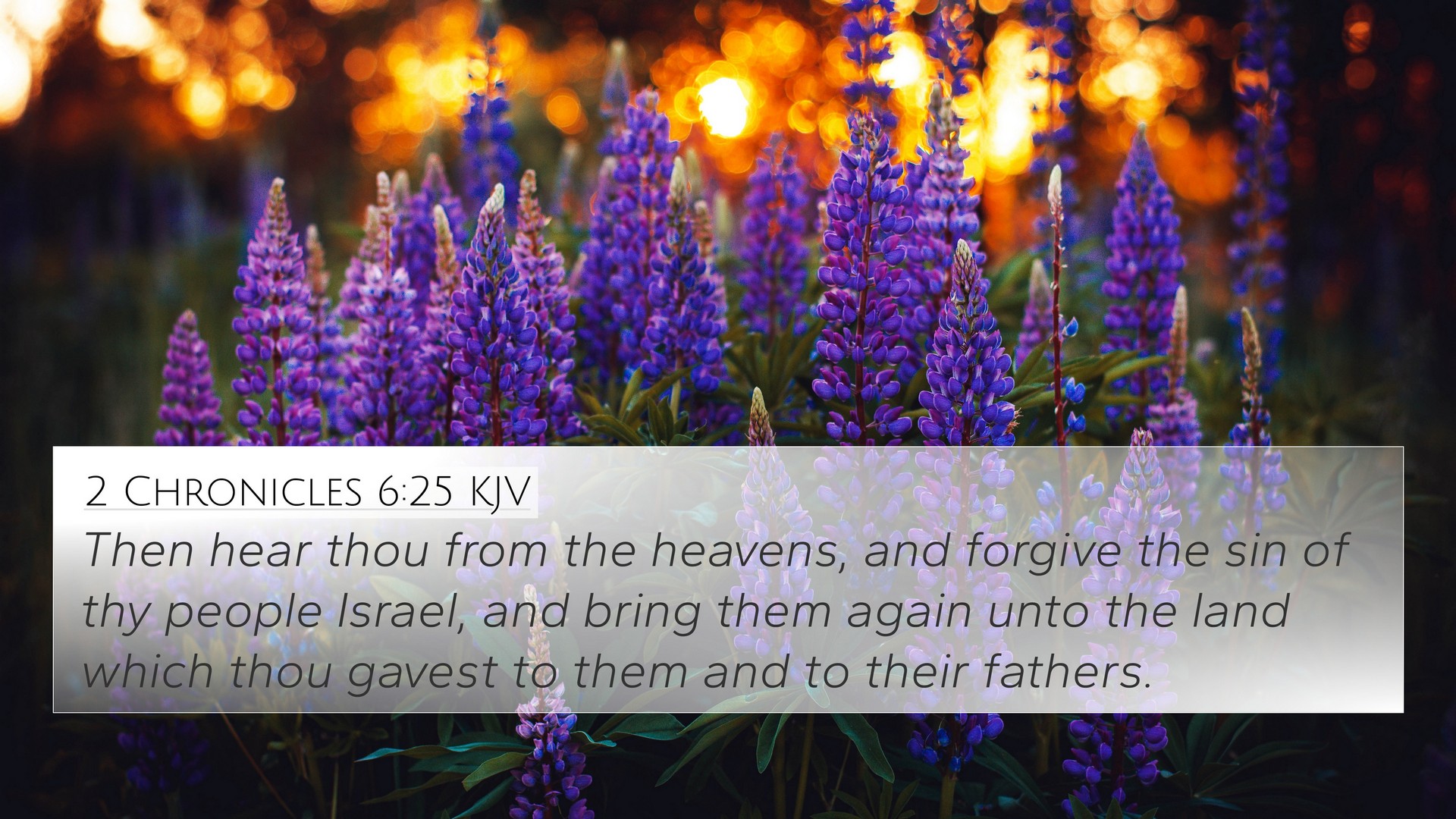Understanding 2 Chronicles 6:25
Bible Verse: “Then hear thou from the heavens, and forgive the sin of thy people Israel, and bring them again unto the land which thou gavest to them and to their fathers.”
Overview of the Verse
This verse is part of Solomon's prayer during the dedication of the temple in Jerusalem. It emphasizes the plea for God's mercy, forgiveness, and restoration of His people. The verse captures a significant moment where the relationship between God and Israel is highlighted, showing the importance of confession and divine intervention.
Commentary Insights
Matthew Henry's Commentary
Matthew Henry points out that this verse depicts a keen desire for God's attention from heaven. Solomon acknowledges the persistent sinfulness of Israel and prays for God's grace, indicating a deep understanding of their covenant relationship. The prayer also reflects the cycles of sin and redemption, which is a recurring theme seen throughout the Scriptures.
Albert Barnes' Notes
Albert Barnes elaborates on the theological implications of this prayer. He emphasizes that Solomon's acknowledgment of Israel's sins shows an understanding of accountability and the necessity of divine forgiveness. The request to bring them back to their land signifies not only a physical return but also a spiritual restoration, hinting at God's ongoing commitment to His people.
Adam Clarke's Commentary
Adam Clarke further discusses the significance of God's promise to the Israelites. Clarke reflects on the historical context and examines the importance of the land, which is symbolic of God’s blessings. He stresses that the verse calls upon God's faithfulness and mercy and underscores the importance of prayer in the life of believers, linking it to the broader theme of dependence on divine guidance.
Cross References
- Deuteronomy 30:3-5: Discusses God’s promise of restoration for His people.
- 1 Kings 8:34: Similar context of prayer for forgiveness and assistance when Israel sins.
- 2 Chronicles 7:14: A call for humility, prayer, and seeking God's face for healing.
- Psalms 51:1-2: A heartfelt plea for mercy and cleansing from sin.
- Isaiah 59:1-2: Discusses the separation caused by sin and God's willingness to forgive.
- Ezekiel 36:26-28: Prophecy of renewal and restoring the people to their land.
- Matthew 6:9-13: The Lord's Prayer, which emphasizes the themes of forgiveness and dependency on God.
- Romans 10:12-13: The principle of calling upon God for salvation.
- Hebrews 4:16: Encouragement to approach the throne of grace with confidence for mercy.
- James 5:16: The power of prayer in the context of confession and healing.
Thematic Connections
This verse underlines significant themes that resonate throughout Scripture:
- Forgiveness: The need for divine pardon is a fundamental aspect of faith.
- Restoration: God’s promise to restore His people is seen from the Old Testament through to the New Testament.
- Intercession: Solomon’s role as intercessor emphasizes the importance of prayer in maintaining a relationship with God.
- God's Faithfulness: The assurance of God’s commitment and promises to His people highlights His unchanging nature.
- Community and National Identity: The connection between the sin of the community and the collective call for repentance.
Using Cross-References for Deeper Study
Cross-referencing Bible texts can provide a deeper understanding and context to the verses we study. The verse from 2 Chronicles 6:25 serves as a gateway to explore themes of forgiveness and restoration that are prevalent in both the Old and New Testaments. Here are a few methods to use in your study:
- Bible Concordance: Utilize a Bible concordance to find related themes and verses.
- Comparative Bible Analysis: Analyze parallels between the Old Testament prayers and New Testament teachings on forgiveness.
- Contextual Studies: Look at the historical context of Israel's relationship with God as illustrated through cross-references.
- Exploring Themes: Investigate larger thematic structures that connect various scriptures on prayer and repentance.
Conclusion
2 Chronicles 6:25 not only calls for God’s attention and mercy but also serves as a reminder of our dependence on Him for restoration and forgiveness. The connections we can draw through various cross-references enhance our understanding of the pervasive themes that shape our faith. By continually referencing and studying these verses, we grow in our spiritual wisdom and relationship with God.








